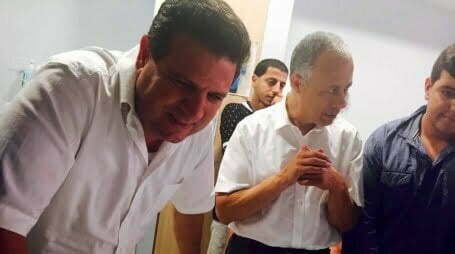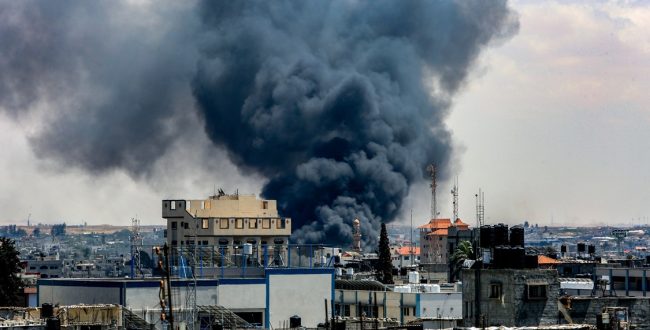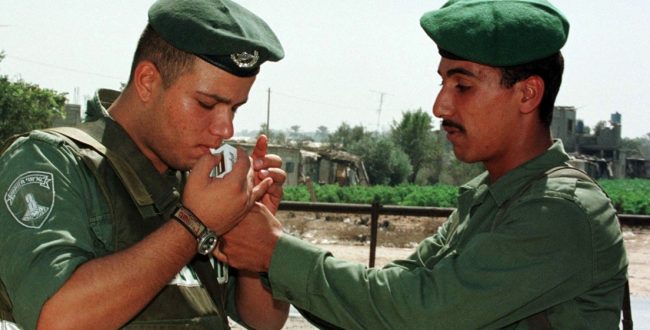The last summer saw another Jewish-Arab (or Israeli-Palestinian) war: an extensive round of fighting between Israel and Hamas that lasted from July to the end of August 2014, dubbed Operation Protective Edge by the IDF. The escalation in military violence was matched by an escalation in public discourse within Israel. Social networks were flooded with comments by Arab citizens of Israel expressing joy when IDF soldiers were killed in Gaza, and by Jewish citizens celebrating injury to Palestinian civilians there.
The Israeli parliament – the Knesset – was in uproar, too. Some three weeks before the fighting broke out in Gaza, Palestinians abducted and killed three Jewish-Israeli teens in the West Bank: Gilad Sha’er, Naftali Frenkel, and Eyal Yifrah. Not long after that, Jewish-Israelis abducted and killed Palestinian teen Muhammad Abu Khdeir from East Jerusalem. In an interview on Radio Tel Aviv shortly after the three Jewish-Israeli teens were abducted, Member of Knesset (MK) Hanin Zoabi (Balad) said that the Palestinian kidnappers were not terrorists: “[…] They’re not terrorists, even if I don’t agree with them […]. These are people who see no other way of changing their reality, so they are forced to use these means […].” In response, the Knesset Ethics Committee decided to suspend Zoabi from plenum debates for six months. This did not deter her from comparing the IDF to ISIS several months later, calling them both armies of unchecked murderers.
Hanin Zoabi was not the only Arab MK to address the IDF’s actions in Gaza and the murder of the three Jewish-Israeli teens last summer. A day after the incursion into Gaza, on July 9, the Knesset plenum held a debate about “the wave of riots and incitement and displays of racism and violence in Israel”. MKs Ahmad Tibi and Ibrahim Sarsour (both from Raam-Taal), and Jamal Zahalka (Balad) accused Israel of perpetrating injustices and war crimes in the West Bank and in Gaza. In a heated exchange, Sarsour called the debate chair, MK Moshe Feiglin (Likud), a “fascist” and a “Nazi”. In contrast, MK Esawi Frej (Meretz) spoke against the expressions of hatred between Jews and Arabs and the suffering of innocent civilians both in Israel and in Gaza.
Identification and condemnation
Various statements made over the years by Arab members of Knesset reflect the vicissitudes of confrontation and reconciliation between Israel and the Arab world in the last two decades, and particularly between Israel and the Palestinians.
After the Oslo Accords and the Israel-Jordan peace treaty were signed, Israeli citizens suffered many terror attacks, both within Israel proper and in the Territories. Mostly suicide missions, these attacks became a routine and often daily occurrence and were condemned by members of Knesset from Arab, Jewish-Arab, and Zionist parties alike.
In October 1994, after a terror attack in central Tel Aviv, MK Hashem Mahameed (Hadash) said that the perpetrators could not be forgiven for their “murderous, criminal, painful act”. MK Saleh Saleem, from the same party, called another terror attack an unfathomable crime and added: “If the perpetrators of the attack intended to harm soldiers – I ask, are these soldiers not human? Do they not have parents?” In late February 1996, two terror attacks were carried out in a single day: one in Jerusalem and the other in Ashkelon. The deputy minister of agriculture, MK Waleed Sadik (Meretz), said in response that the attacks contradicted human morality and did not accord with the values of Islam. MK Azmi Bishara, who headed Balad at the time, said that inflicting or attempting to inflict any harm on innocent people is immoral and cannot be accepted, even if it is the result of a just struggle. MK Abdulwahab Darawshe (Mada) condemned the attacks, too, while also accusing the Israeli government of effectively contributing to regional violence. Deputy Knesset Chair Saleh Tarif (Labor) condemned terror attacks in Kfar Darom and Netzarim Junction (settlements within Gaza) and called on the Israeli government to enter Gaza and help the Palestinian police operate against the Islamic Jihad and Hamas.
Across the board, Arab MKS harshly condemned the attacks and urged the Israeli and Palestinian leaders to choose peace. Some argued that the painful losses made it all the more important that Israel stick by the peace process, as stopping negotiations would be a victory for Hamas and the Islamic Jihad. MK Sadik (Meretz) even put together a delegation of Arab citizens of Israel to meet with Hamas leaders and plead with them to resolve the Palestinian issue through negotiations rather than terrorism. In contrast, Arab MKs from the right-wing Likud party objected to the Israeli compromise with the Palestinians in the Oslo Accords. Asaad Asaad stated that he would not back the agreement when it would be brought before the Knesset. Ayoob Kara went so far as to support the idea of a parliamentary commission to examine the agreement, and later voiced support for continued construction in West Bank settlement, as he saw no hope for the Israeli-Palestinian peace process.
The second Intifada and the events of October 2000
The second Intifada broke out in late 2000, seven years after the Oslo Accords and six years after the Israeli-Jordanian peace treaty. Initially, it was marked by violent clashes between security forces and Arab demonstrators within Israel proper.
“The Events of October 2000”, in which 13 Arab citizens of Israel were killed by security forces, were a turning point in relations between the Israeli establishment and its Arab citizens. This found expression, among other things, in the discourse adopted by Arab MKs.
Several weeks after the events, MK Mohammad Barakeh (Hadash) took part in a conference held at Bir-Zeit University, in the West Bank, under the title “Continuing the Intifada”. Barakeh called on Arab citizens of Israel to not stop at passive support of the Intifada and play an active role in it. In a November 2001 meeting with then-President of the Palestinian Authority Yasser Arafat in Ramallah, MK Ahmad Tibi and said that the Intifada would ultimately vanquish the Israeli occupation and that the Palestinian struggle was a just fight for independence. Over the course of the Intifada, Arab MKs frequently condemned Israel’s suppression of the popular Palestinian uprising. MK Issam Makhoul (Hadash) compared IDF soldiers to Nazis and later to the Taliban; MK Azmi Bishara (Balad) called them sex perverts who found an outlet for their sexual aggression by shooting at children.
At the same time, Arab MKs continued to condemn the frequent terror attacks against Israeli citizens during the Intifada. In a visit to Ramallah in September 2002, Azmi Bishara said that harming civilians, and particularly suicide attacks, was not a strategic act but rather the result of weakness and lack of strategy. Jamal Zahalka expressed sorrow over the victims of the attacks and added that although the Palestinian struggle for an independent state is a just one, it must not turn into a cycle of vendettas. However, for the first time, Arab MKs began to voice a new kind of opinion. Some did not rule out the terror attacks from a strategic perspective, or declared the government of Israel responsible for the attacks. For example, in an interview on Abu Dhabi TV after a 2001 terror attack in the heart of Tel Aviv, MK Talab el-Sana (Raam) said that the attack was part of the legitimate Palestinian struggle.
In an attempt to eradicate terrorism, Israel began to assassinate the persons responsible for planning the attacks. responses to this by Arab MKs varied over the years; again, the events of October 2000 were the watershed point. In January 1996, when Israel assassinated Yihya ‘Ayash, the “Engineer” who initiated and oversaw many suicide attacks, MK Mahameed said that the assassination did not serve the peace process nor attempts to build trust between Israel and the Palestinians. Deputy Health Minister Nawaf Mazalha (Labor) expressed hope that Israel and the Palestinian Authority would uphold the peace process, and MK Abdulwahab Darawshe said that he regretted the assassination as he would regret any bloodshed that perpetuated the cycle of violence. Almost a decade later, Arab MKs responded much more harshly to the assassination of Hamas leader Ahmad Yassin in March 2004, calling it murder and dubbing the Israeli government “a violent gang” and “a government of terrorism and a source of evil and danger”.
The rounds of fighting in Lebanon and Gaza
The IDF operations in the West Bank and in Gaza drew vehement criticism from Arab MKs. In May 2004, the IDF killed eight Palestinians, including four children, when firing shells close to the Philadelphi Route in Gaza. MK El-Sana said in response that “what is being done today in the Tal a-Sultan and Rafah refugee camps shows that you don’t have to be German to be a Nazi, and you don’t have to be German to perpetrate Nazi acts. The Palestinian people are undergoing a new Holocaust.” Mohammad Barakeh termed it genocide, claimed that the IDF was murdering Palestinians in cold blood, and called on the Knesset to exercise its conscience and “throw the government to hell”. MK Tibi called Defense Minister Shaul Mofaz, Chief of Staff Moshe Ya’alon, and Air Force Commander Eliezer Shkedi war criminals, fascists, and an embarrassment to the human race. Two years later, the IDF assassinated Islamic Jihad operative Muhammad Dahdouh in Gaza, killing civilians in the process – including a little boy, his mother, and his grandmother. MK Nadia Hilou (Labor) voiced reserved criticism of the targeted assassination policy, noting that “there is no shame in defense but also in being humane.”
responses by Arab MKs to the clashes between the IDF and Hamas in Gaza in recent years have varied substantially between Zionist and Arab parties. Of the former, Raleb Majadele (Labor) called on Hamas to stop firing rockets at Israel, on the IDF to stop the war, and on both sides to enter peace negotiations; Ayoob Kara (Likud) called the rocket fire “a criminal and intolerable act”; and Majallie Whbee (Kadima) claimed that the IDF should destroy Hamas and not allow the organization to dictate Israel’s security agenda. MKs from Arab parties responded very differently. Hanin Zoabi (Balad) said on an Israeli news program that Israelis, as an occupying nation, have no right to live a normal and safe life. Her party member Jamal Zahalka said on another Israeli program that Defense Minister Ehud Barak “listens to classical music and kills children”. During the IDF’s 2010 Operation Pillar of Defense in Gaza, MK Afou Agbaria (Hadash) posted a picture on his Facebook page depicting Prime Minister Netanyahu with blood-covered hands.
Reasons for the shift in Arab MKs discourse
Why have the views expressed by Arab MKs on matters of war and peace changed so drastically over the years?
Political affiliation is one major influence. Statements by Arab MKs from Zionist parties have been considerably more moderate than those issued by MKs from Arab parties (such as Balad and Mada) and even from the Jewish-Arab party Hadash. Abdulwahab Darawshe, who was a member of Knesset from 1984 to 1999, is a case in point. In January 1988, shortly after the first Intifada broke out, he left the Labor party and founded the first Arab party in Israeli politics – the Arab Democratic Party (Mada). Darawshe’s comments on matters of war and peace became more extreme and seemed at times as though he felt the need to whitewash his past in a Zionist party, which is identified in Arab society in Israel with various injustices, including the period of martial law and land expropriation.
A second major factor is religious-ethnic identity. Druze MKs (who usually belong to Zionist parties) tend to voice hawkish opinions, certainly compared to other Arab MKs. This was the case with Saleh Tarif, Ayoob Kara, Majallie Whbee, and Asaad Asaad, all of whom are IDF officers in reserve duty and some of whom lost family members to the fighting – facts that significantly affect their opinions and statements.
Third, some Arab MKs seek to prove their objection to government policies because certain sections of Palestinian society in Israel have questioned their legitimacy – as membership in the Israeli parliament renders them part of the Zionist establishment.
Importantly, however, Arab politics within Israel have become much more diverse in the last twenty years. As mentioned, there was not a single Arab political party in Israel until 1988. From 1988 to 1996, only one Arab party had members of Knesset; from 1996 to 1999, two Arab parties were represented; and as of 1999, the Knesset has included representatives of three Arab parties. Naturally, the number of Arab MKs has risen accordingly. Israel currently has 16 Arab members of Knesset – as opposed to nine in the 12th Knesset (1988-1992). The proliferation of Arab parties has generated rivalry between their members, placing them in competition with Arab civil society organizations in Israel over the quality and extent of their achievements. As with the Jewish MKs, the battle is not only over political survival but also over media exposure. This internal jousting often results in provocative media statements. Indeed, Arab MKs have complained in the past that their comments on the Palestinian issue – which are often blatant – find their way to the media while their condemnation of terror attacks does not.
Arab MKs are also affected by the growing Arab separatism within Israel. They are fighting for leadership of domestic Arab society, faced with players who oppose Arab participation in parliament. These include the secular Abnaa el-Balad movement, the northern branch of the Islamic Movement, and civil society organizations that use legal tactics, among other things, to advance the status of Arab citizens in Israel. Some of these players are no strangers to provocation. For example, Raed Salah, head of the Islamic Movement’s northern branch, spat in the face of a Border Patrol officer during a demonstration against digging close to the Temple Mount / al-Haram a-Sharif.
The central role of Israeli politics
Yet all the reasons cited above are not the major explanation for the significant shift in Arab MKs’ discourse. The main reason consists of several turning points in relations between the Israeli establishment and Arab citizens since 1993. One pivotal period was the second Rabin government (1992-1996), which signed agreements with the Palestinians and with Jordan, began diplomatic cooperation with other Arab countries, and adopted a new policy towards Arab citizens of Israel. For the first time in Israel’s history, large budgets and significant resources were invested in developing Arab communities. There was a general sense of hope and expectation among Arab citizens of Israel, and this softened the statements of their representatives in parliament.
By the same token, the events of October 2000 caused a dramatic rupture between the state and its Palestinian citizens. The latter, and particularly MKs, repeatedly claimed that the Israel Police had been trigger happy in many cases both during the events and afterwards. A series of increasingly violent clashes on the Lebanese front (the second Lebanon war) and on the Palestinian front (especially the wars involving IDF operations Cast Lead, Pillar of Defense, and Protective Edge) widened the rift even further.
The radicalization evident in comments made by Arab MKs also stems from the overall feeling that Arab citizens of Israel are suffering increasing delegitimization. In almost every general election, the Central Elections Committee decides to disqualify Arab MKs and their parties, and the High Court of Justice then revokes the decision. Moreover, Arab MKs feel that they are not seen as legitimate partners for various coalitions. A marked example was the 1999 elections: although Ehud Barak won thanks to Arab votes, he did not include any of the Arab parties in his coalition. In the 2013 elections, Yair Lapid won 19 mandates as head of the Yesh Atid party, but declared that he had no intention of forming a blocking majority with Arab MKs – or “the Zoabis”, as he called them. In March 2015, on Election Day, Prime Minister Netanyahu urged supporters to go out and vote since Arab citizens were “going to vote in droves” and endangering the right-wing government.
The increased vitriol among Arab MKs is also the result of verbal and even physical violence directed at them. In one instance, Jewish MK Anastassia Michaeli poured a glass of water over MK Raleb Majadele at a meeting of the Knesset Education Committee (January 2012). Another form of this is the recent slew of bills seen as an attempt to undermine the status of Arab citizens: the “loyalty” and “nationality” laws, the raised threshold for entering the Knesset, and others.
At the end of the day, the increasingly radical statements made by Arab MKs primarily reflect the growing rift between Jews and Arab in Israel. State authorities and the Arab leadership within Israel must take action to prevent the situation from deteriorating any further.
Translator: Michelle Bubis
















